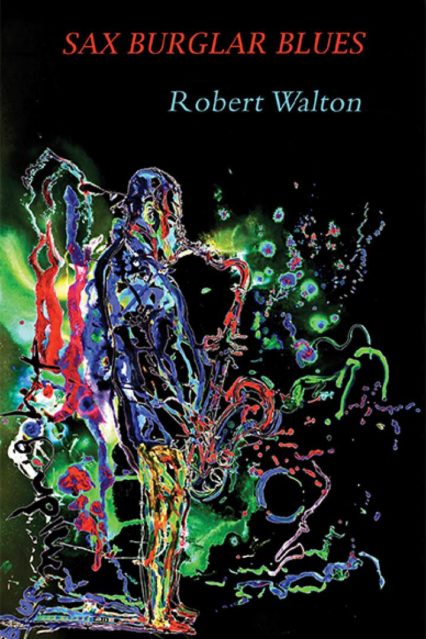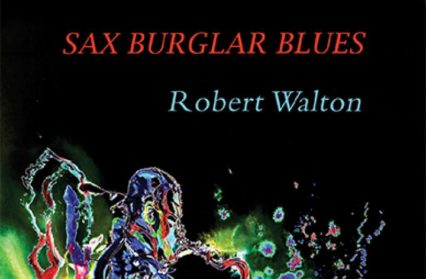Sophie Baggott reviews Sax Burglar Blues, a new poetry collection by Robert Walton that embodies his experience in multimedia areas.
Robert Walton’s new poetry collection, Sax Burglar Blues, is a terrifically exotic embodiment of his multi-multi-multimedia background. With a writing career behind him that spans work with artists across dance, film, music, storytelling and installation, his poems have timbres and optics that are at times sensational.

The poetry bops between the most intimate of memories and run-of-the-mill happenings; both can be shaped into magical scenes. Walton enlivens everyday moments with fantastical qualities. The collection opens with a musician plodding his way through rush hour, but in Walton’s eyes, this is an enormous beetle – a “thorax-swinging jazz scarab” who is imagined into an underworld plot that totally belies the ordinariness of the episode.
Walton’s most beautiful poem, ‘Greenland’, traces what initially seems to be an impression of a frozen, bleached landscape: “This bolt of satin… Look for a vein of blue, you’ll never find it.” As the poem develops, it becomes painfully clear that he is writing of something else – a throbbing, tender recollection of an altogether different absence of colour. (To reveal the twist would, of course, ruin it.)
The vocabulary can tend towards the outlandish – read: alienating – end of the lexical spectrum, which sometimes lends an inaccessible element to reading Walton’s poetry. Without a dictionary to hand, that is. Does anyone really know the meaning of coleoptera, pizzicatos, or carapacial? These words all arise in the very first poem.
This is a minor criticism of a spectacular selection of poems, however. Robert Walton truly beautifies what he sees. His work is a sosban of senses, spilling over with the sounds and sights of rural Wales. To pick out a few phrases: “dazzling tinfoil day”, “horizons aslant”, “scud of clouds”, “scramble of plosives” each add visceral details to various poems.
Colour, too, is sloshed across the pages. The palette varies in its potency: in ‘Cyfri’r Geifr (Counting the Goats)’ it is clichéed: the goats are “whiter than snow … blacker than a witch’s cauldron … redder than a dragon’s blood”. Set in a classroom, the poem’s imagery is bound to be unsophisticated. Elsewhere, in ‘Making a Herringbone Harris Tweed Garment’, colour is used to stunning effect. Describing the yarn woven into the material, the poet conjures up dyes drawn from nature’s pigments. Each verse multiplies the number of colours involved so that by the end we have:
She sews the black and grey, the blue, orange and brown, the red
and green and white, the dye
of the windswept dune, the mountain hare in its winter coat,
the cirrus clouds,
wave, machair and sky
Walton is an expert at harvesting images from the outdoors, swishing between the bucolic and the utterly rugged. Another poem that strikes a lovely harmony amid the blend of themes was ‘Blackberries in August’, which offers up lines such as “black globes hanging by a thread, | each one a constellation | of dark stars glancing light”. A few poems later, another, ‘Ash’, flourishes in natural imagery. The last stanza watches the tree flowering: “to burst into a sphere of green fire. | Its leaves can conjure lovers to a lover’s | dreams and in its glinting canopy | the blackbird sings all summer.”
People are far from the main focus of the poet’s eye – he seems almost to prefer the authenticity of observing nature. When he does write of individuals, it tends to be from afar and with emphasis on what’s genuine or not. This is perhaps most evident in his poem ‘Incident at Birdcage Walk’, in which a woman hobbles along high-heeled, lipsticked and suited in a suffocating outfit, but then literally flies when she steps out of her heels – all the better without artifice.
Glimpses of loved ones crop up rarely, but intensely when they do. In a poem about his grandfather, ‘Man and Boy’, it grows obvious that this man treats his grandson with an affection that his daughter did not receive. The poem ends with the lines: “And while the dog gazes into his master’s eyes, | you close the cosmic, enclose me in your arms.” It is an odd poem – loving but with hints of distance.
This atmosphere follows into the next poem, ‘Up the Bluebirds!’, written for Walton’s father. The poet describes phonecalls in which his father joyfully roars at Cardiff City’s goals, while the son tries to feign enthusiasm. His Bluebirds scarf, alas, “lies folded in the dark” of a wardrobe somewhere. Again, the familial love is there – but with a slight chink between the people involved. Walton is heavily aware of his deceit, well-intentioned and harmless as it is.
One aspect that may puzzle readers somewhat (and the reasoning behind which I would like to know more about) is the poet’s habit of harping back to particular phrases. To share just one example, the adjective “hunch-backed” appears in two separate poems – then in a third is adapted slightly to “hump-backed”. Is there a significance to this?
For me, this was a poetry collection of polarities – I felt a lot for some poems, and very little for others. Yet, on the whole, the poetry’s zest and embellishments made it a wonderful read. I’d heartily recommend it as a medicine for anyone feeling vaguely low: dip into Walton’s jazzed-up version of the world and you will inevitably surface from the pages in a brighter hue.
Sax Burglar Blues is available now from Seren.
Sophie Baggott is a regular Wales Arts Review contributor.











